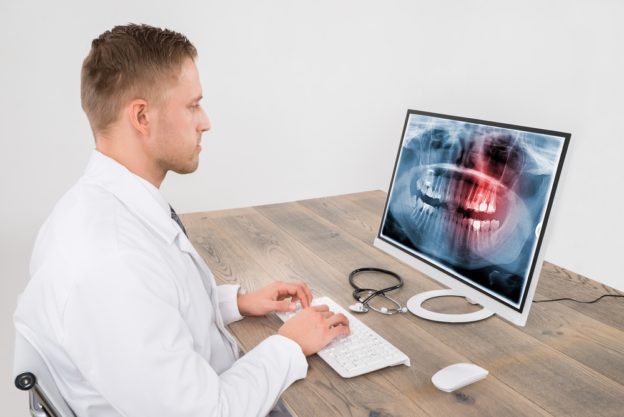For most people, wisdom teeth removal recovery is smooth and problem-free. However, tooth extraction comes with some risks, and one of the most common is dry socket, or alveolar osteitis.
Dry socket causes aching or throbbing pain in the gums and jaw, and the pain can radiate throughout the head and neck. Typically, the condition appears within three to five days after wisdom teeth removal.

What Causes Dry Socket?
After wisdom tooth removal, a blood clot forms to protect the exposed nerves during the healing process. During a normal recovery, soft tissue and bone grow to cover the clot and seal the gums.
Alveolar osteitis occurs when the blood clot dislodges or dissolves before the tooth extraction site has fully healed. The exact cause has not yet been discovered, but researchers suspect that bacterial contamination or trauma at the surgical site could be involved.
Are You at Risk for Dry Socket?
Anyone can develop alveolar osteitis after wisdom tooth removal, but certain factors increase your risk. You may be more likely to suffer this complication if you:
- Smoke or use tobacco
- Take oral contraceptives
- Have impacted wisdom teeth
A current or pre-extraction infection also boosts the risk of alveolar osteitis, as do poor oral hygiene habits. And some studies have shown that the chance of this wisdom tooth complication may increase with age.
Can You Prevent Dry Socket?
Alveolar osteitis is not entirely preventable, but you can take steps to minimize your risk of developing the complication. To give yourself the best chance at an easy recovery, follow your oral surgeon’s wisdom tooth removal aftercare instructions. The professionals at Richmond Oral and Maxillofacial Surgery advise patients to:
- Skip smoking or using tobacco
- Keep the mouth clean, without vigorously rinsing
- Refrain from spitting
- Drink from a cup, not through a straw
- Avoid strenuous activity for at least a week
- Stick to a soft-food diet until the gums have healed
Rest assured, if your wisdom teeth removal is scheduled at Richmond Oral and Maxillofacial Surgery, we will take every possible step to ensure you have a smooth, complication-free recovery. Dr. Partridge and Dr. Alderman, the oral surgeons here at Richmond Oral and Maxillofacial Surgery, have extensive experience with third-molar extractions and complete every procedure with expert, compassionate care.
If you live in the greater east central Indiana area and need wisdom teeth removal or are concerned about your risk of dry socket, contact us to schedule a consultation today.



